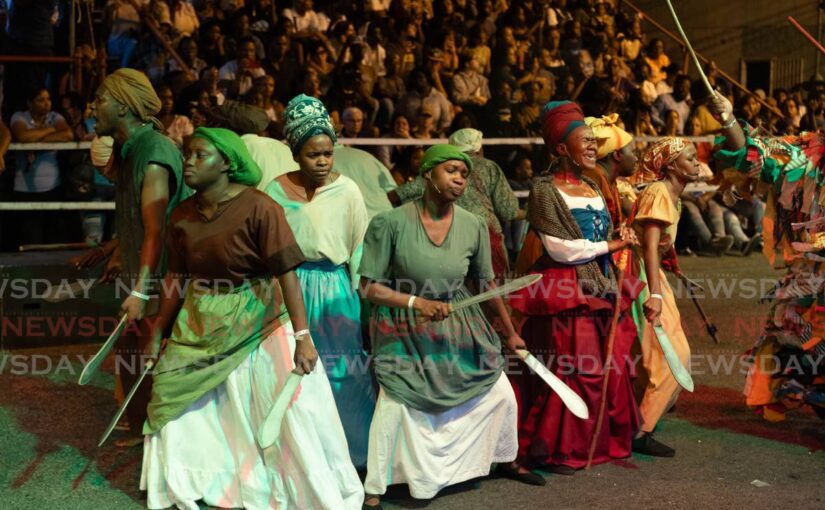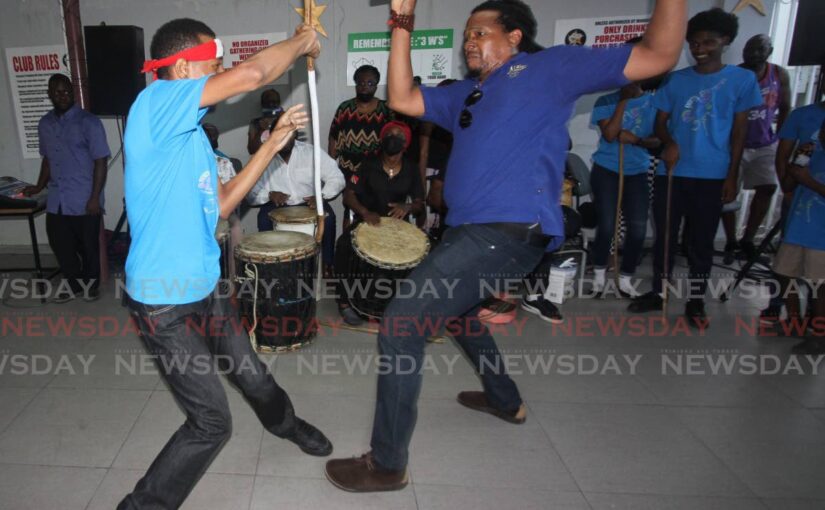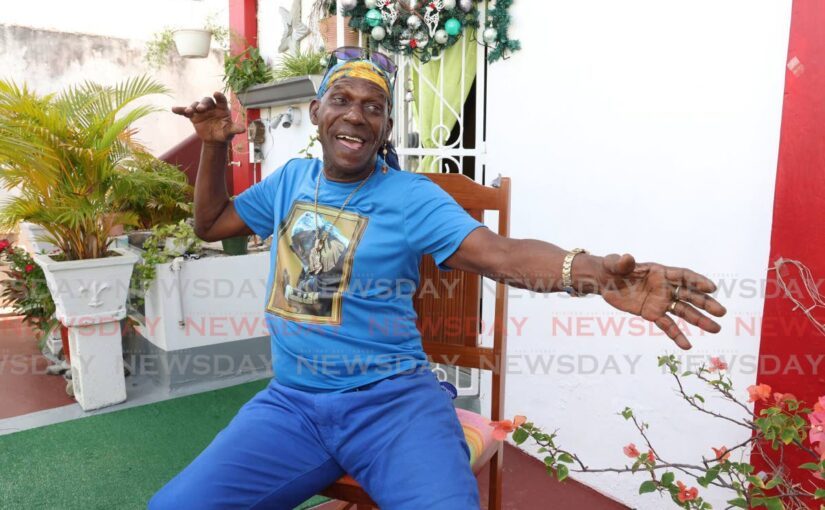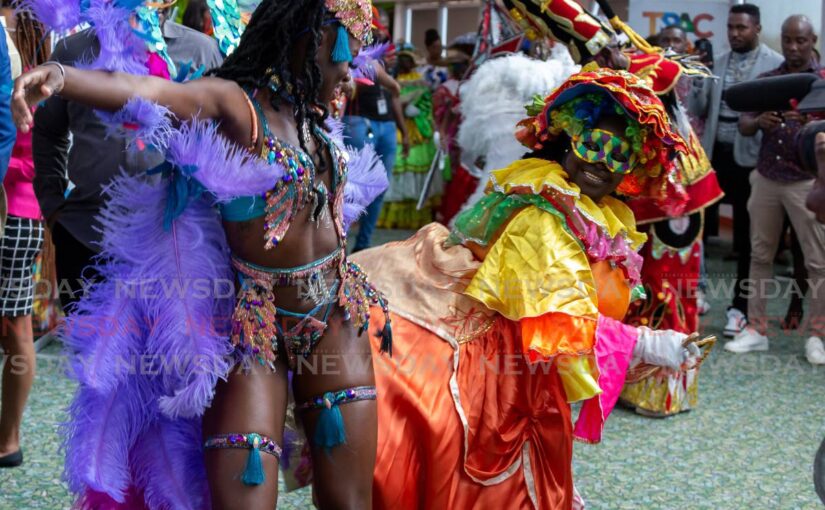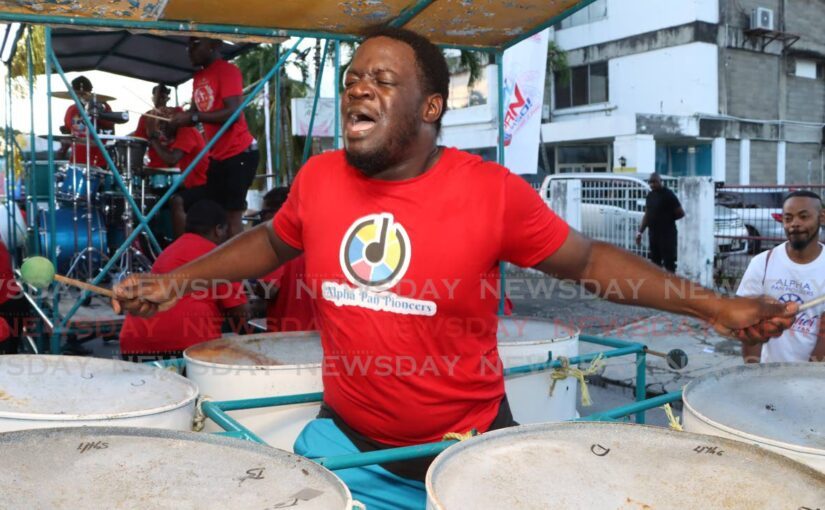The Kambule Spirit of Carnival Festival 2025 begins its lineup with the Lacouray in Lakou Wi series of conversations on January 17 with a discussion...
Vous n'êtes pas connecté
- English
- Français
- عربي
- Español
- Deutsch
- Português
- русский язык
- Català
- Italiano
- Nederlands, Vlaams
- Norsk
- فارسی
- বাংলা
- اردو
- Azərbaycan dili
- Bahasa Indonesia
- Հայերեն
- Ελληνικά
- Bosanski jezik
- українська мова
- Íslenska
- Türkmen, Түркмен
- Türkçe
- Shqip
- Eesti keel
- magyar
- Қазақ тілі
- Kalaallisut ; kalaallit oqaasii
- Lietuvių kalba
- Latviešu valoda
- македонски јазик
- Монгол
- Bahasa Melayu ; بهاس ملايو
- ဗမာစာ
- Slovenščina
- тоҷикӣ ; toğikī ; تاجیکی
- ไทย
- O'zbek ; Ўзбек ; أۇزبېك
- Tiếng Việt
- ភាសាខ្មែរ
- རྫོང་ཁ
- Soomaaliga ; af Soomaali
Rubriques :
 Maroc - NEWSDAY.CO.TT - A la Une - Hier 04:04
Maroc - NEWSDAY.CO.TT - A la Une - Hier 04:04
Idakeda Group explores hidden history of Carnival
For the third consecutive year, the Idakeda Group is educating people, opening their eyes to the history, spirituality and importance of TT Carnival, via the Kambule Spirit of Carnival Festival. Event founder and managing director of the Idakeda Group Dara Healy, a Newsday columnist, said the festival was created to expand the education opportunities of experiencing and delving into Carnival. “Some of our objectives include emphasising the educational aspect of Carnival in terms of showcasing young artists and sustainability within Carnival and showcasing it to a wider range of people, age groups and demographics.” She said each year the organisation looks at a controversial or topical subject it’s necessary to address, and this year’s theme is Africa in the Carnival. Launched on January 17 at The Shop at Lakou Wi, 12 Warner Street, Newtown, Port of Spain, the festival schedule began with a lecture and performance, and will end on March 9 with a new offering, the Hidden History of Carnival Tour. Lakou Wi is patois for We Yard. The schedule includes Kambule school shows, stickfighting for women, lectures, mas-making workshops for both children and adults, and performances. The main highlight of the festival is Kambule, a play written and directed by Healy’s mother, poet and playwright Eintou Pearl Springer. Idakeda and its Kambule Performing Arts Collective have been staging the play since 2004. It’s a ritual early-morning re-enactment of the 1881 Canboulay riots, at the Piccadilly Greens in East Port of Spain on Carnival Friday. This year’s performance is on February 28 at 4 am The Canboulay riots took place between 1881 and 1884 in response to the efforts of colonial police, led by Captain Baker, to restrict certain aspects of the Carnival celebrations. Many people were injured or killed as result of the riots. Canboulay comes from the French "cannes brulees," meaning "burnt cane". It was originally a harvest festival for the enslaved Africans. Healy’s sister Attillah Springer, also an Idakeda director and producer of Kambule, said when the cast arrived at the staging area at midnight or 1 am, they often found people already in the stands because they wanted a good seat. [caption id="attachment_1134985" align="alignnone" width="736"] Sisters Dara Healy, left, and Attillah Springer at The Shop @Lakou.WI on Warner Street, Newstown, Port of Spain. - Photo by Ayanna Kinsale[/caption] She has also heard about students sleeping at their schools so they would be ready when a maxi or bus comes to pick them up to attend the performance. “When we hear all of the different stories people have, it says to us what we’re doing has an impact.” Healy added that TT was the only place a Carnival-related play starts at 4 am at a place where usually, people were afraid to go, yet there has never been a negative incident at the event. “It is about reclaiming these spaces that were, historically, of oppression and resistance, and re-framing them in a particular way that tells people, ‘This is ours and we have a right to be here. We belong here and we should not be afraid to be here, because this is we thing. This is our people. This is our history. These are our heroes – people who knew they could have died but fought and lost their lives.’” The sisters lament that such amazing aspects of the country’s history are not taught in schools. Springer said while doing research for her master’s in Carnival studies, she realised many people – both those who have access to information and those who do not – had never heard of the Canboulay riots or Kambule. Both groups attended school at some point, but the education system teaching was “not teaching us about ourselves.” She said another part of history not taught in schools is that the Yoruba were the last set of Africans to come to TT en masse. Though not under the same arrangement as the Indian indentured labourers, 6,000 Yoruba people, from West Africa, came at the same time as the country’s first Indians after Emancipation, and hence were never enslaved. Say when the first indentured Indians came & when emancipation was. & why they were brought “Because they were so organised, industrious, and had a strong sense of community, and because they came in such large numbers, they were able to re-invigorate what had been creolised.” [caption id="attachment_1134986" align="alignnone" width="1024"] In this file photo, some of the drummers at the re-enactment of the Canboulay riots at Piccadilly Street, Port of Spain on February 9, 2024. - Photo by Jeff K. Mayers[/caption] This is one reason there is still a strong Orisha tradition in TT. She said Carnival arts and community theatre tries to fill the gaps in the education system. The Kambule Performing Arts Collective tries to give young people a space to enact their history and culture. There, Springer sees an element of the warrior spirit, of ancestral memory and of young people trying to figure out their boundaries and themselves. She said many of the children who are considered disruptive in school are the most talented. They have skills, but nowhere to express them. The collective allows them that space, as well as a place to talk through their issues and better express themselves. She added that Kambule, the play, addresses many topics including mas, African spirituality, the relationship between Carnival and rebellion, and the country’s history. The festival breaks down Kambule into bite-sized pieces, expanding on those topics. So in addition to the play, the Kambule Spirit of Carnival Festival had De Jamette Ball, an ole-mas competition. Jamettes were seen in a negative light, but the sisters are seeking to reclaim the word, as male and female jamettes were part of the resistance movement in 1881 and before. Healy explained “jamette” comes from the French word diamètre, which means “diameter.” So they were “below the line” of poverty and respectability, an underclass of formerly enslaved Africans who were left unemployed and lived in the barrack yards. “They used their bodies, they used their sexuality, they used their knowledge of African culture, secrets and so on, to reclaim the traditions that (the colonisers) attempted to take away.” Springer noted that those living in the barrack yards lived difficult lives, but still found ways to create, express themselves and take back their power through comedy and satire, to dress down the elite. She said part of it was mocking their masters, but another part was pointing out injustices in society and disrupting order, which came out in the mas they played. The newest festival experience will be the Hidden Histories of Carnival tour of Port of Spain. Springer said the capital city is full of history – where Claudia Jones, the mother of Notting Hill Carnival, lived; where the Mighty Shadow was born; or where Ken Morris started to make copper mas – but none of it is marked or recognised. [caption id="attachment_1134987" align="alignnone" width="1024"] Performers re-enact the Canboulay Riots during the launch of Kambule: The Spirit of Carnival 2025, traditionally held at 4 am on Carnival Friday. - Photo by Elexzine Bissoo[/caption] There is also a Make a Mas workshop where, with the guidance of Citizen Bat masmakers, people will learn how to use materials and make mas for the Jamette Ball, or to play with the Citizen Bat mas experience on Carnival Monday and Tuesday. And there will be a Kids’ Kambule with Cherisse Berkeley, niece of renowned masman the late Wayne Berkeley, and Jaiso Moko. Healy said the festival is about inviting people into a space that encourages people to embrace Carnival as their own, and it is appropriate for all ages. “Because the masquerade is so rooted in African culture, history, spirituality, heritage and so on, there’s a separation from it. There has been a movement away from the rootedness of Carnival into more shiny expressions of it. “Just like in the 1800s, there have been all kinds of disparaging statements about how the mas look, how people behave, the route, everything. And yet we will not take it back to its emancipatory origins, because Carnival started off as an emancipation celebration on August 1.” She said by having it right before Ash Wednesday and linking it with the Christian Lenten season of reflection and renewal, a separation was created between the people who created the Carnival and the rest of society. She believed it should be given a set day linked to emancipation, and embraced as a festival that comes from history, has value and should be incorporated into who Trinidadians are as a people. She said people should be thinking about ways to invest in the industry and to create clear career paths for creative young people, many of whom are bored with the school system and the way even creative subjects like pan and art are being taught. The Idakeda directors thanked the festival’s supporters, the National Carnival Commission, TT Newsday, the National Gas Company of TT, Republic Bank Limited, the National Drama Association, the National Library and Information System Authority, the San Fernando Arts Council – Creative Arts Centre, San Fernando and UTT’s Academy for the Performing Arts. Events: January 29 – 6 pm : Make A Mas – Workshop in collaboration with Citizen Bat, Lakou Wi January 31 – 6 pm : De Jamette Ball – Ole mas competition celebrating protest mas in Carnival, Lakou Wi February 9 – 1 pm : Hidden History of Carnival – Port of Spain tour, Lakou Wi February 12 – 10 am : Kambule school workshops – Exploring the history and practice of Trinidad Carnival, Nalis, Port of Spain February 19 – 10 am : Kambule School Show ; Creative Arts Centre, San Fernando February 28 – 4 am : Kambule, play by Eintou Springer – Ritual re-enactment of the 1881 Canboulay riots to be followed by traditional mas characters parade, Piccadilly Greens March 4 – 1 pm : The Meeting Place – Lime and Link Up at Lakou Wi on Carnival Tuesday, Lakou Wi March 8 – 6 pm : Stickfight and self-defence – Kalinda workshop for women in observance of IWD, Lakou Wi March 9 – 10 am : Hidden History of Carnival – Port of Spain Tour, Lakou Wi The post Idakeda Group explores hidden history of Carnival appeared first on Trinidad and Tobago Newsday.
Articles similaires
SuperBlue’s soca version of history
The lyrics are easy to recall, easy for anyone to sing – but the song’s premise is anything but simple. Austin “SuperBlue” Lyons and Romell...
Sex on the stage
Dara E Healy Jean: “What make you feel that you better than the rest of us? After all these years, insisting that you never make a fares yet....
Will the real Dame Lorraine please stand up?
Once Upon a J’Ouvert: part two of a three-part series by Sonja Dumas If you’ve ever witnessed traditional mas, one of the first characters that...
Tobago band reigns with Rainorama at pan semis
Pan Trinbago president Beverley Ramsey-Moore said Saturday’s small-band conventional semifinals was one of the largest the organisation had seen in...
Trinidad and Tobago promoters forming global carnival alliance
The Trinidad and Tobago Promoters Association (TTPA) is collaborating with promoters worldwide to form a global carnival alliance. TTPA advocate...
Promoters working to assure patrons’ safety at events
The TT Promoters Association (TTPA) has said it will continue to invest in ensuring people are safe when they attend events in Trinidad, in spite of...
Soca sensation
SOCA is back. First came, in November, the energetic debate triggered by Scorch Radio’s list of the top 101 soca songs in history. Then there was...
Busted: Tulsi Gabbard attacked surveillance reforms she now claims to support
Former Hawaii Congresswoman Tulsi Gabbard faces a major obstacle to getting confirmed as President-elect Donald Trump's director of national...
Carnival 365
“We want permission to mash up the place “To give the music some jammin’ space” Permission to Mash Up the Place, David Rudder “Do you...
Les derniers communiqués
-
Aucun élément
